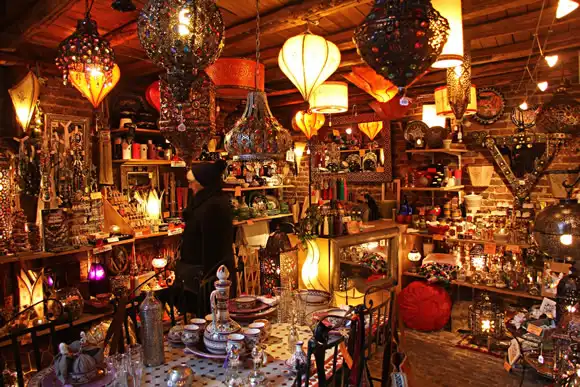Like any other business, gift shops are prone to risks. If a hurricane rages all night and blows a tree down onto the roof, causing a leak, within a few hours, all the cards and other gift items in the shop will get soaked with water. Selling this inventory is no longer possible, and the shop owner will suffer losses. The roof will also need to be repaired and the inventory replaced before business operations can resume.
These damages come at a significant cost. There are several other scenarios, too, which can bankrupt a business. Gift shops can arm themselves with a safety net by purchasing adequate commercial insurance. This is a step in the right direction to ensure a sustainable, profitable business.
This blog covers potential liabilities and the various types of commercial insurance available for gift shops to protect themselves from a spectrum of risks.
Potential risks of running a gift shop
Gift shops are exposed to several risks, especially since customers and visitors frequent them. Here's a snapshot of things that can go wrong:
- Gift shops could be targeted for burglary, some shops have high-value figurines or other knick-knacks.
- Cases of vandalism can lead to extensive property damage and breakage of inventory.
- There is potential for customers to get injured due to accidents. At times it can occur due to carelessness or negligence on the part of the gift shop. This can result in third-party lawsuits, which lead to mounting expenses.
- Property may also be destroyed due to water damage caused by wind damage to a roof or if the automatic sprinklers go off when a fire breaks out.
- Gift shops can incur losses if their inventory is damaged or stolen during transportation or when the vehicle is damaged in an accident.
- Employee injury
Commercial insurance is a necessary investment today for gift shops. It can help them recover from tough times and carry on through the years.

Types of commercial insurance for gift shops
Here is a snapshot of insurance that is recommended for gift shops:
General Liability Insurance
This is the most basic type of insurance designed to help businesses protect themselves from third-party damages. Gift shops tend to be public spaces frequented by customers all day. Several things can go wrong. These include bodily injury of third parties, like visitors to the store, incidents caused by negligence, and personal and advertising injury. For instance, if a customer enters the premises and meets with an accident, they may decide to sue the gift shop owner. By taking a general liability insurance policy, this policy can pay for legal fees, the cost of investigation and the compensation the court awarded to the third party. This type of business insurance also covers incidents where the business owner may slander a competitor and be sued.
Commercial Property Insurance
This type of business insurance is designed to protect businesses from loss or damage to business property. Regardless if you own the building or are renting commercial space, property insurance is needed for what your business owns. For instance, natural calamities such as hurricanes may cause roof damage resulting in leaks and damaging your inventory of gift items, cards, and furniture. Other causes of property losses include fire, theft, lightning, riot, vehicles, vandalism, and more. Without commercial property insurance, it becomes extremely expensive to replace inventory. With it, the costs will be reimbursed, and the business can recover right away for covered claims.
Business Owner's Policy
A Business Owner's Policy always includes at least general liability and property insurance. You may be able to add other relevant insurance categories. These include business interruption, employee dishonesty, theft of money, computers, signs, and more. Gift shops that fit into the small to medium size company category would typically qualify for a Business Owner's Policy, which covers several types of losses under one policy.
Business Income Insurance
There are several cases due to which the daily operations of the business are completely stopped. It could be due to the break out of a fire or extensive building damage from other covered perils. When a gift shop has property insurance that pays for rebuilding the structure, revenues will stop coming in until the work is completed and the store reopens. During this period of recovery, business interruption coverage will replace net lost revenue. These amounts assist the insured in paying ongoing expenses such as payroll, mortgage, taxes, and utility bills.
Commercial Auto Insurance
Gift shop businesses may own vehicles for several reasons. Business owners may own commercial vehicles used to transport inventory. If the gift shop also has a home delivery model, it may use transportation to deliver gifts and pick up returns within the neighborhood. Carrying commercial auto insurance is important if this is the case.
Business auto insurance combines coverage for several scenarios. Loss or damage to owned vehicles in cases of theft, vandalism, fire, flood, and accidents. For instance, if the vehicle's driver in an accident is negligent, this policy protects the business owner from third-party bodily injury and property damage liability lawsuits. It also covers damage to the vehicle.
Auto bodily injury and property damage liability are included with commercial auto coverage, just like on your personal auto insurance. When your driver is at fault for an accident, this coverage pays the injured party's damages and takes care of the damage to their vehicle.
Workers' Compensation Insurance
Gift shops may hire full or part-time employees, customer service, drivers, and cashiers. Employees may also have accidents, which can result in injury or death. Workers' compensation insurance covers medical expenses, wage loss, and death benefits for the next of kin.
Takeaway
The cost of commercial insurance for gift shops depends on several factors, including the type of merchandise sold, the value of business assets insured, the location, prior claims, annual revenue, and payroll. Being insured is a necessity and a safeguard against several potential risks.


